人教版(2019)高中英语必修第三册 学案Unit2 Morals and Virtues易混易错点辨析(有答案)
文档属性
| 名称 | 人教版(2019)高中英语必修第三册 学案Unit2 Morals and Virtues易混易错点辨析(有答案) | 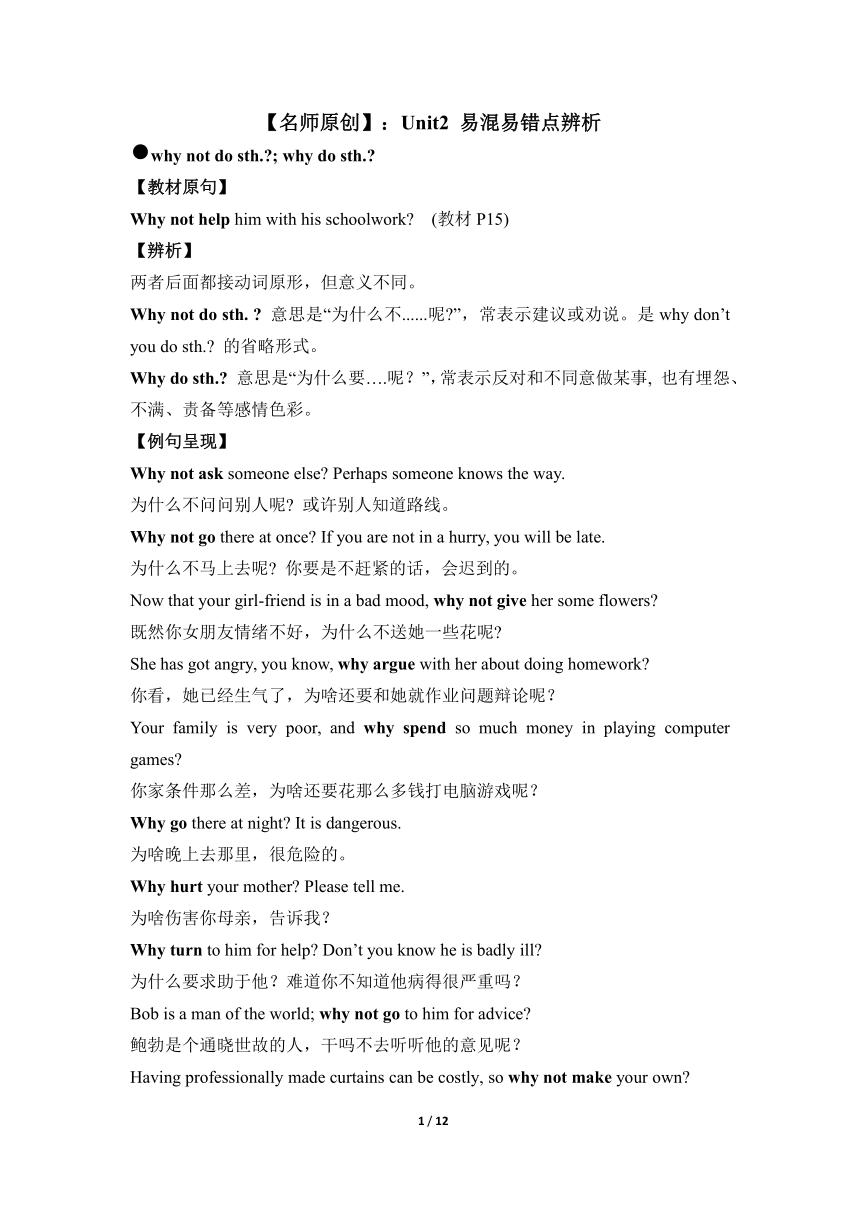 | |
| 格式 | docx | ||
| 文件大小 | 33.2KB | ||
| 资源类型 | 教案 | ||
| 版本资源 | 人教版(2019) | ||
| 科目 | 英语 | ||
| 更新时间 | 2023-03-10 15:07:47 | ||
图片预览

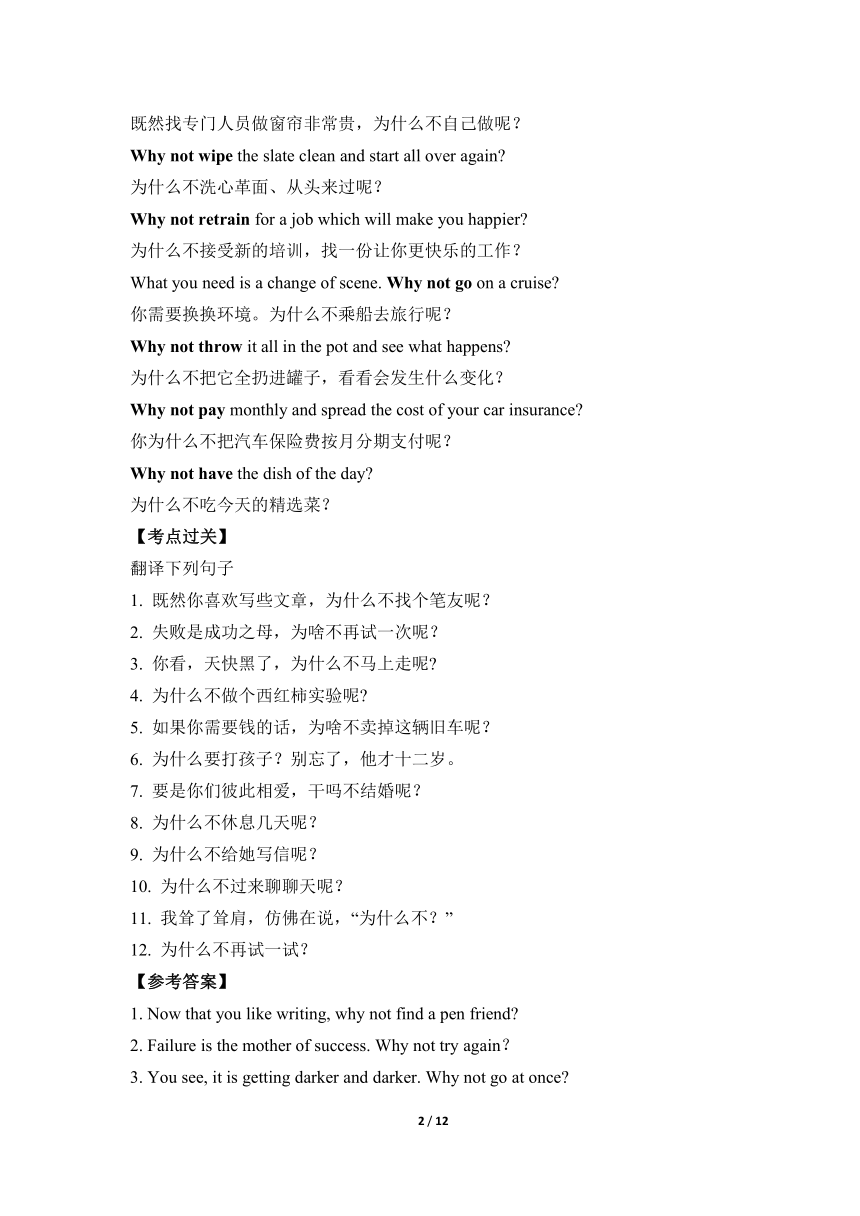
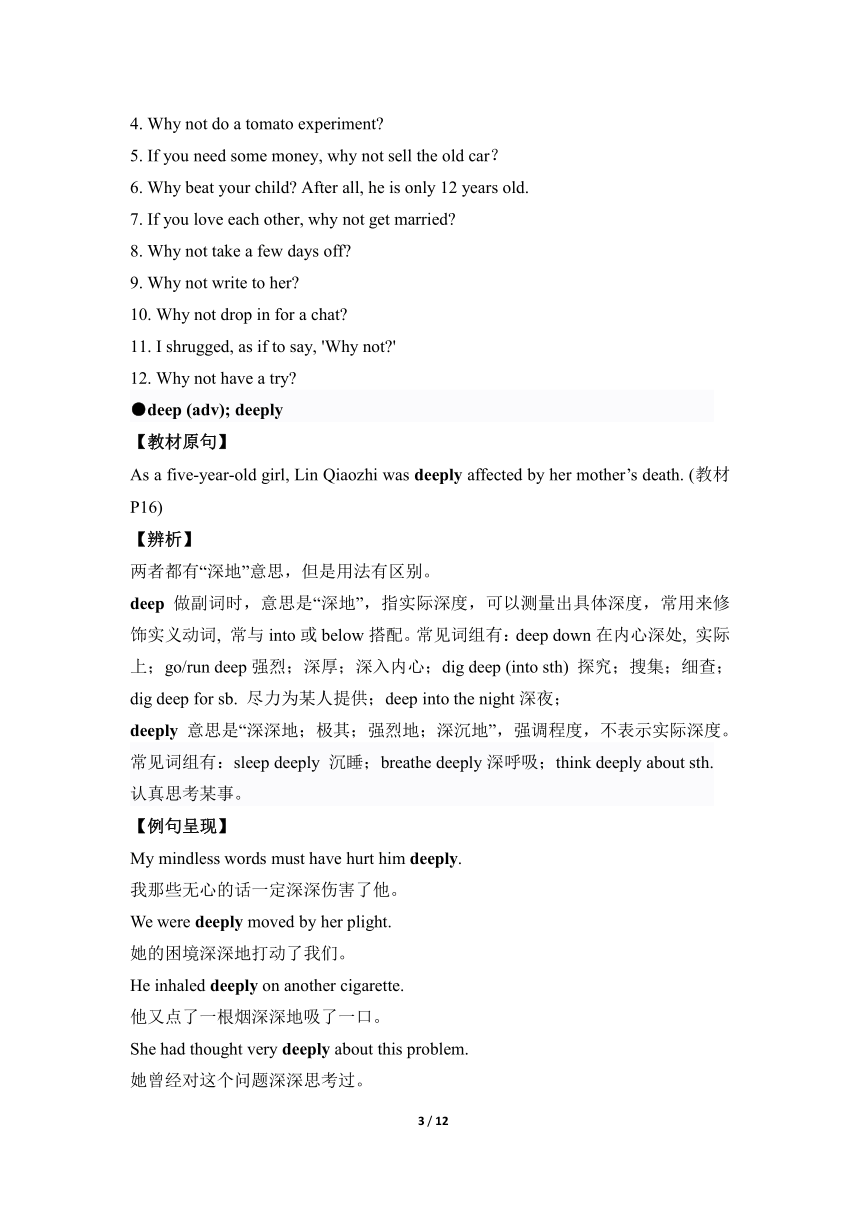
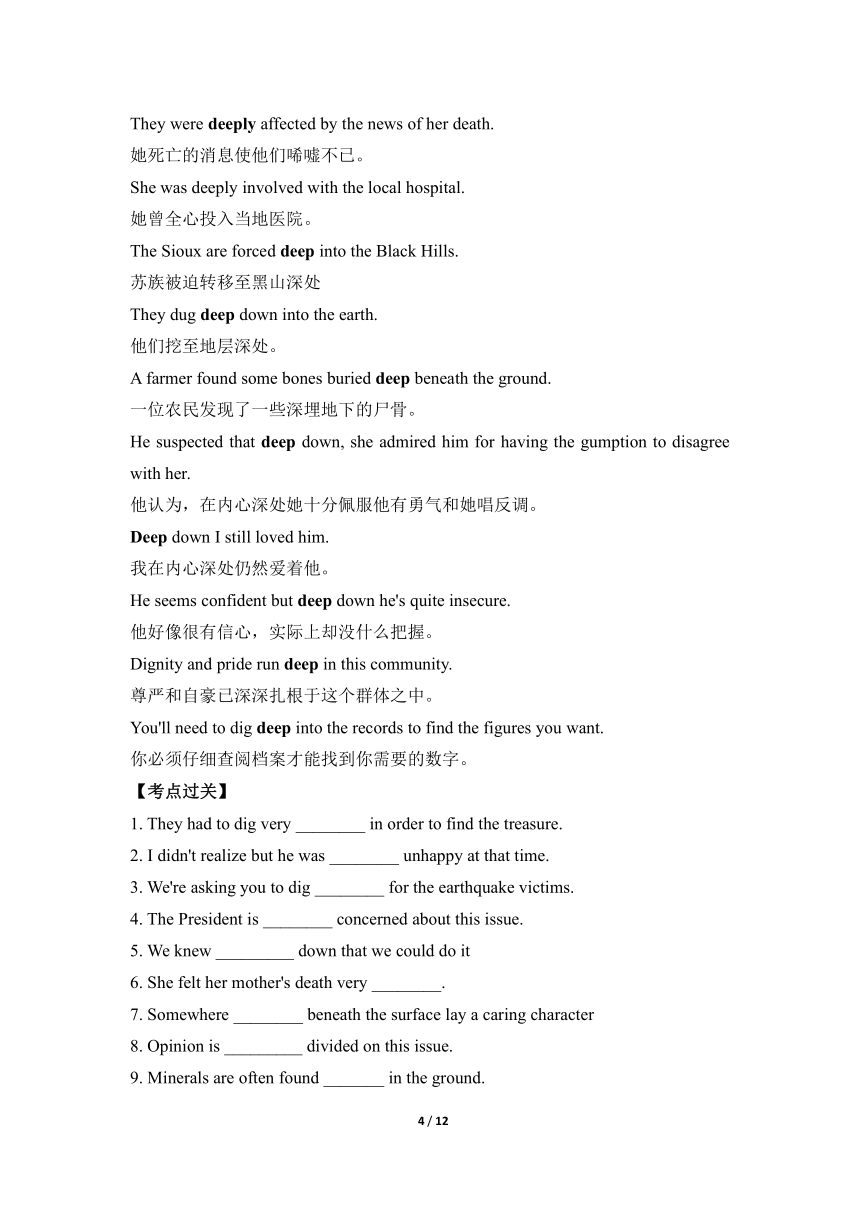
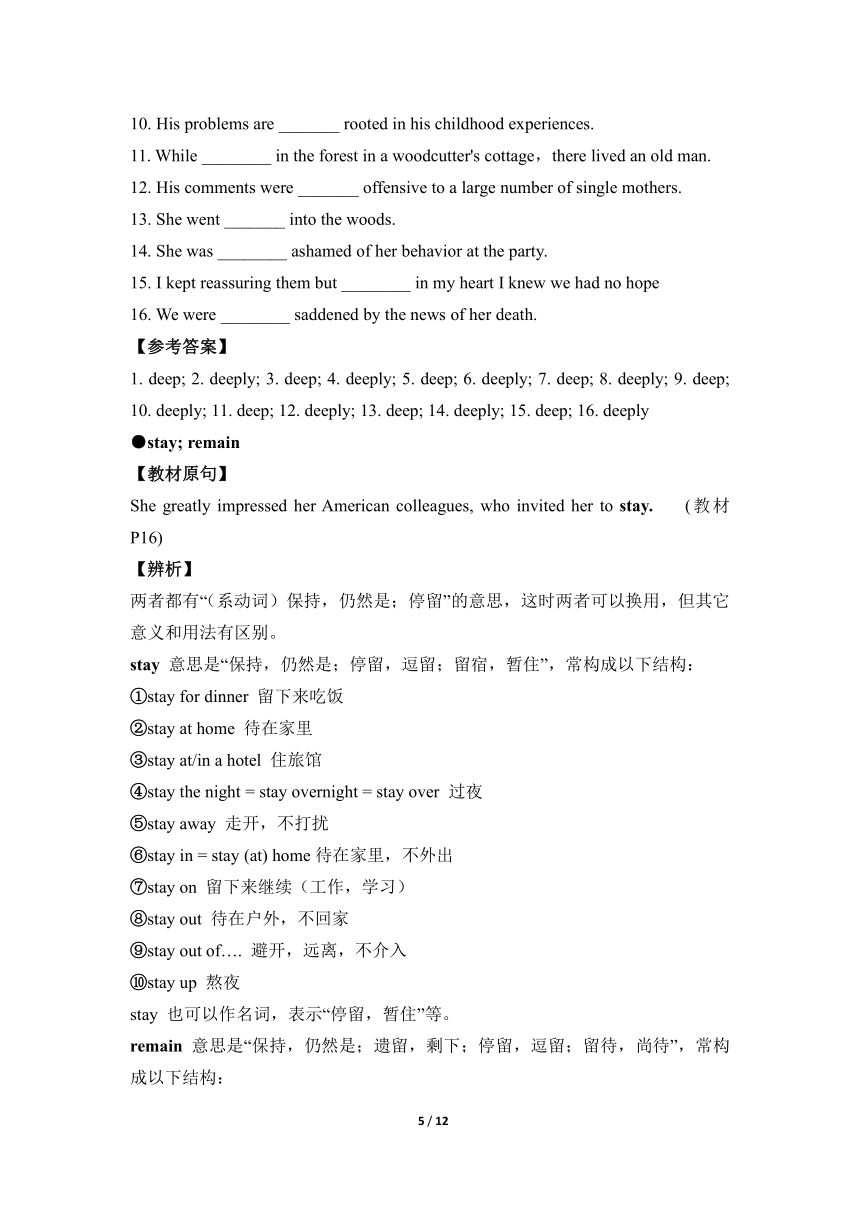
文档简介
【名师原创】:Unit2 易混易错点辨析
●why not do sth. ; why do sth.
【教材原句】
Why not help him with his schoolwork (教材P15)
【辨析】
两者后面都接动词原形,但意义不同。
Why not do sth. 意思是“为什么不......呢 ”,常表示建议或劝说。是why don’t you do sth. 的省略形式。
Why do sth. 意思是“为什么要….呢?”,常表示反对和不同意做某事, 也有埋怨、不满、责备等感彩。
【例句呈现】
Why not ask someone else Perhaps someone knows the way.
为什么不问问别人呢 或许别人知道路线。
Why not go there at once If you are not in a hurry, you will be late.
为什么不马上去呢 你要是不赶紧的话,会迟到的。
Now that your girl-friend is in a bad mood, why not give her some flowers
既然你女朋友情绪不好,为什么不送她一些花呢
She has got angry, you know, why argue with her about doing homework
你看,她已经生气了,为啥还要和她就作业问题辩论呢?
Your family is very poor, and why spend so much money in playing computer games
你家条件那么差,为啥还要花那么多钱打电脑游戏呢?
Why go there at night It is dangerous.
为啥晚上去那里,很危险的。
Why hurt your mother Please tell me.
为啥伤害你母亲,告诉我?
Why turn to him for help Don’t you know he is badly ill
为什么要求助于他?难道你不知道他病得很严重吗?
Bob is a man of the world; why not go to him for advice
鲍勃是个通晓世故的人,干吗不去听听他的意见呢?
Having professionally made curtains can be costly, so why not make your own
既然找专门人员做窗帘非常贵,为什么不自己做呢?
Why not wipe the slate clean and start all over again
为什么不洗心革面、从头来过呢?
Why not retrain for a job which will make you happier
为什么不接受新的培训,找一份让你更快乐的工作?
What you need is a change of scene. Why not go on a cruise
你需要换换环境。为什么不乘船去旅行呢?
Why not throw it all in the pot and see what happens
为什么不把它全扔进罐子,看看会发生什么变化?
Why not pay monthly and spread the cost of your car insurance
你为什么不把汽车保险费按月分期支付呢?
Why not have the dish of the day
为什么不吃今天的精选菜?
【考点过关】
翻译下列句子
1. 既然你喜欢写些文章,为什么不找个笔友呢?
2. 失败是成功之母,为啥不再试一次呢?
3. 你看,天快黑了,为什么不马上走呢
4. 为什么不做个西红柿实验呢
5. 如果你需要钱的话,为啥不卖掉这辆旧车呢?
6. 为什么要打孩子?别忘了,他才十二岁。
7. 要是你们彼此相爱,干吗不结婚呢?
8. 为什么不休息几天呢?
9. 为什么不给她写信呢?
10. 为什么不过来聊聊天呢?
11. 我耸了耸肩,仿佛在说,“为什么不?”
12. 为什么不再试一试?
【参考答案】
1. Now that you like writing, why not find a pen friend
2. Failure is the mother of success. Why not try again?
3. You see, it is getting darker and darker. Why not go at once
4. Why not do a tomato experiment
5. If you need some money, why not sell the old car?
6. Why beat your child After all, he is only 12 years old.
7. If you love each other, why not get married
8. Why not take a few days off
9. Why not write to her
10. Why not drop in for a chat
11. I shrugged, as if to say, 'Why not '
12. Why not have a try
●deep (adv); deeply
【教材原句】
As a five-year-old girl, Lin Qiaozhi was deeply affected by her mother’s death. (教材P16)
【辨析】
两者都有“深地”意思,但是用法有区别。
deep 做副词时,意思是“深地”,指实际深度,可以测量出具体深度,常用来修饰实义动词, 常与into或below搭配。常见词组有:deep down在内心深处, 实际上;go/run deep强烈;深厚;深入内心;dig deep (into sth) 探究;搜集;细查;dig deep for sb. 尽力为某人提供;deep into the night深夜;
deeply 意思是“深深地;极其;强烈地;深沉地”,强调程度,不表示实际深度。
常见词组有:sleep deeply 沉睡;breathe deeply深呼吸;think deeply about sth.认真思考某事。
【例句呈现】
My mindless words must have hurt him deeply.
我那些无心的话一定深深伤害了他。
We were deeply moved by her plight.
她的困境深深地打动了我们。
He inhaled deeply on another cigarette.
他又点了一根烟深深地吸了一口。
She had thought very deeply about this problem.
她曾经对这个问题深深思考过。
They were deeply affected by the news of her death.
她死亡的消息使他们唏嘘不已。
She was deeply involved with the local hospital.
她曾全心投入当地医院。
The Sioux are forced deep into the Black Hills.
苏族被迫转移至黑山深处
They dug deep down into the earth.
他们挖至地层深处。
A farmer found some bones buried deep beneath the ground.
一位农民发现了一些深埋地下的尸骨。
He suspected that deep down, she admired him for having the gumption to disagree with her.
他认为,在内心深处她十分佩服他有勇气和她唱反调。
Deep down I still loved him.
我在内心深处仍然爱着他。
He seems confident but deep down he's quite insecure.
他好像很有信心,实际上却没什么把握。
Dignity and pride run deep in this community.
尊严和自豪已深深扎根于这个群体之中。
You'll need to dig deep into the records to find the figures you want.
你必须仔细查阅档案才能找到你需要的数字。
【考点过关】
1. They had to dig very ________ in order to find the treasure.
2. I didn't realize but he was ________ unhappy at that time.
3. We're asking you to dig ________ for the earthquake victims.
4. The President is ________ concerned about this issue.
5. We knew _________ down that we could do it
6. She felt her mother's death very ________.
7. Somewhere ________ beneath the surface lay a caring character
8. Opinion is _________ divided on this issue.
9. Minerals are often found _______ in the ground.
10. His problems are _______ rooted in his childhood experiences.
11. While ________ in the forest in a woodcutter's cottage,there lived an old man.
12. His comments were _______ offensive to a large number of single mothers.
13. She went _______ into the woods.
14. She was ________ ashamed of her behavior at the party.
15. I kept reassuring them but ________ in my heart I knew we had no hope
16. We were ________ saddened by the news of her death.
【参考答案】
1. deep; 2. deeply; 3. deep; 4. deeply; 5. deep; 6. deeply; 7. deep; 8. deeply; 9. deep; 10. deeply; 11. deep; 12. deeply; 13. deep; 14. deeply; 15. deep; 16. deeply
●stay; remain
【教材原句】
She greatly impressed her American colleagues, who invited her to stay. (教材P16)
【辨析】
两者都有“(系动词)保持,仍然是;停留”的意思,这时两者可以换用,但其它意义和用法有区别。
stay 意思是“保持,仍然是;停留,逗留;留宿,暂住”,常构成以下结构:
①stay for dinner 留下来吃饭
②stay at home 待在家里
③stay at/in a hotel 住旅馆
④stay the night = stay overnight = stay over 过夜
⑤stay away 走开,不打扰
⑥stay in = stay (at) home待在家里,不外出
⑦stay on 留下来继续(工作,学习)
⑧stay out 待在户外,不回家
⑨stay out of…. 避开,远离,不介入
⑩stay up 熬夜
stay 也可以作名词,表示“停留,暂住”等。
remain 意思是“保持,仍然是;遗留,剩下;停留,逗留;留待,尚待”,常构成以下结构:
①remain + adj. = stay + adj. 保持….
②remain + n = stay + n 仍然是…..
③remain + prep. + 地点 = stay + prep. + 地点 待在某地,但是,可以说stay (at) home,不能说remain at home, 只能用remain home,去掉at, 两词组可换用。
④sth. remain to be done 某事尚待做
⑤it remain to be seen + wh-从句 …..有待观察/看/尚待定论
⑥there remains ….尚有…..
remain 可以做名词,意思是“遗迹,残留物”
【例句呈现】
Most of the house remains intact even after two hundred years.
虽然过了两百年,这房子的大部分还保持完好。
The temperature remained constant while pressure was a variable in the experiment.
做这实验时温度保持不变,但压力可变。
It remains to be seen whether his project will fly.
他的计划能否成功尚需拭目以待。
The disease often remains undetected for many years.
这种疾病经常潜伏多年而不被察觉。
There remains the problem of finance.
财政问题仍然存在。
It remains to be seen whether or not this idea can be put into practice.
这一想法能否付诸实践还有待于观察。
We went on to Paris and stayed/remained there eleven days.
我们接着去了巴黎,在那里停留了十一天。
We stayed/remained in a village where time has stood still.
我们待在一个时间似乎凝滞了的村子里。
She stayed at home, afraid to show her face.
她待在家里,不敢露面。
We stayed up all night, setting the world to rights.
我们一夜没睡,谈论着如何拯救世界。
I want you to stay away from my daughter.
我要你离我女儿远远的。
His parents won't allow him to stay out late.
他的父母不会允许他在外待得很晚。
【考点过关】
用remain, stay的适当形式填空
1. She _______ home while the children were young.
2. I went to Ningxia and _______ there for one year.
3. We promised ________ friends for ever.
4. We must ________ competitive in the competitive society.
5. I ________ on the job for five months when they left.
6. Birds’ singing is sometimes a warning to other birds _______ away.
7. You should leave those naughty boys _______ out of trouble.
8. Last month, Tom wrote two articles during his short _______ in hospital.
9. So far many of his songs _______ popular.
10. We were told ________ in our seats meanwhile with our seat belts fastened.
11. I never see what has been done; I only see what_______ to be done.
12. It ________ to be seen whether you are right.
13. There ________ one significant problem now.
14. Please _______ calm when you meet with some difficulties.
15. You should ________ quiet when someone is making a speech.
【参考答案】
1. stayed/remained; 2. stayed/remained; 3. to stay/remain; 4. stay/remain; 5. Stayed; 6. to stay; 7. to stay; 8. stay; 9. have remained/stayed; 10. to remain/stay; 11. remains; 12. remains; 13. remains; 14. remain/stay; 15. stay/remain
●be known as…; be known for…; be known to….
【教材原句】
Though Lin Qiaozhi never married, she was known as the “mother of ten thousand babies”, having delivered over 50, 000 babies in her lifetime. (教材P17)
【辨析】
be known/well-known as….. = be famous as….. 表示“作为…..而出名/著名”,后面常接表示职业或身份的名词。
be known/well-known for…. = be famous for…. 表示“因为…而出名/著名”,后接出名的原因。
be known/well-known to….. = be famous to….. 表示“为…..所知;对…..来说是出名/著名的”,后接人、团体或地域的名词。
【例句呈现】
You want to be known for your work, not your rumor radar.
你应该以你的工作表现而为人熟知,而不是以你的八卦能力。
Kobe has always been known for being an extreme competitor.
科比一直以一种对于胜利近乎偏执的渴求而闻名。
China is known for tea and pandas.
中国因为茶叶和熊猫而为世人所知。
Mary was known as a poet.
玛丽作为诗人而知名。
They retreat along an ancient Native American path that will later be known as Broadway.
他们沿着一条原住民的小道撤退,这条小道便是日后的百老汇大道
Jon Snow, the King in the North, will be known as the White Wolf.
北境之王琼恩 雪诺会被称为“白狼主”。
The news will be known to everybody in the course of time.
过一段时间人人都会知道消息的。
Do you want to be known to many people and admired by them
你追求声誉吗?你希望许多人都知道你赞赏你吗?
He hopes to be known to all peoples.
他希望我为所有人熟知。
The song is known to many young people.
这首歌为许多年轻人熟知。
【考点过关】
根据be known for…..; be known as… 和 be known to….用法填空
1. The policy will be known ______ all the people.
2. The British are known _______ laughing at themselves.
3. Having been working with you for such a long time, my name shall be known _____ each of you.
4. The country is known _______ sending rockets up to space quickly.
5. New York may be known _______ its skyscrapers.
6. Edison was known _______ an inventor in the world.
7. He would be known ________ the game.
8. She wants to be known ________ a movie star.
9. Now it will be known _________ holding the 2008 Olympic Games.
10. The people(民族) is always known ________ longstanding traditional service and hospitality.
【参考答案】
1. to; 2. for; 3. to; 4. for; 5. for; 6. as; 7. for; 8. as; 9. for; 10. for
●not…any more (= no more) ; not… any longer (= no longer)
【教材原句】
“Don’t try to rescue me any more. Don’t waste the medicine any more.” (教材P17)
【辨析】
两者都有“不再”的意思,no more/not…any more与no longer/not…any longer同义,但用法有所区别。
not…any more (= no more)意思是“不再”,通常放在be动词和行为动词之后,一般与瞬时动词或be 动词连用,往往表示程度或数量不再增加,次数不再重复。
not… any longer (= no longer)意思是“不再”,通常放在行为动词前,be动词的后面,往往表示某状态或某个动作在某个时刻之后不再继续下去了, 一般和延续性动词或表示状态的动词连用。
温馨提示:not... any longer和not... any more中的not须和be动词或助动词连在一起构成否定形式,而any longer和any more则放在句尾。
【例句呈现】
Not wishing to antagonize her further, he said no more.
他不愿惹她更生气,便不再说话。
He promised there would be no more hesitations in pursuing reforms
他发誓,在致力于改革方面不再犹豫。
He could stand no more and engineered an escape
他无法再忍受,便策划了出逃。
Finally, he could do no more, which is where Jacques came in.
最后,他再也无能为力了,这也正是雅克发挥作用的时候。
Rudolph said no more. Apparently he was a man of few words.
鲁道夫没再说话。看来他是个寡言少语的人。
I'm no longer a student.
我不再是个学生了。
He no longer lives here. =he doesn't live here any longer.
他不在这儿居住了。
He was no longer a thief.
他不再是小偷了。
When there is no gravity, our feet no longer stay on the ground.
如果没有重力,我们的脚就不能再站稳在地面上。
She could no longer find a way to get into the valley.
她再也找不到进山谷的路了。
【考点过关】
根据no longer (= not…any longer) 和no more (= not….any more) 用法填空
1. Time or opportunity lost will return _______.
2. She could not keep up with him ________
3. We couldn't stand it ________.
4. These conditions _______ obtain.
5. I will say _______ on these matters, important though they are
6. The choice is _______ in their disposition.
7. I've had enough of your insolence, and I'm having _______.
8. Phonograph is _______ used nowadays.
9. This word is ______ in current use.
10. She _______ feared that they should misunderstand her.
【参考答案】
1. no more; 2. any longer; 3. any more; 4. no longer; 5. no more; 6. no longer; 7. no more; 8. no longer; 9. no longer; 10. no longer
●neither…. nor…. ; not only… but also
【教材原句】
Neither she nor her friends thought about moving the stone out of the road. (教材P20)
【辨析】
两者都是并列连词,但意义和用法有一定区别。
neither……nor….. 既可以连接两个并列句子成分,也可以连接两个并列句子,表示“既不…..也不……”,强调两者都不。
温馨提示:
①当连接两个并列主语时,句子谓语动词要遵循就近原则,即与第二个主语保持一致;
②当引导两个并列句子时,两个句子都要倒装;
③当强调“A怎样,B也怎样”时,B做主语的句子用倒装。
not only…but also既可以连接两个并列句子成分,也可以连接两个并列句子,表示“不仅…..而且….”,着重强调后者,其中, only有时可以换成just; also有时可以省略。
温馨提示:
①当连接两个并列主语时,句子谓语动词要遵循就近原则,即与第二个主语保持一致;
②当引导两个并列句子时,not only 引导的句子要倒装;
③not only…but also的形式比较固定,但也会出现but与also被分隔开来的情形。
【例句呈现】
Light and bright colors make people not only happier but more active.
浅色和鲜艳的颜色不但使人看了高兴,也会使人更加活泼。
Shakespeare was not only a writer but (also) an actor。
莎士比亚不仅是一位剧作家,而且是一位演员。
If your friend reminds you kindly of your faults, take what he says not only pleasantly but thank fully.
如果低朋友善意地指明出你的缺点,你不但要欣然接受,而且要心怀感激之情。
Man has become master not only of the sky but also of the space.
人类不但征服了天空,而且征服了太空。
Not only has he a first-class brain but also he is a tremendously hard worker.
他不仅有着头等聪明的脑子,而且工作很能吃苦。
Professor Smith spoke neither English nor German
史密斯教授既不会讲英语,也不会讲德语。
Neither could theory do without practice, nor could practice do without theory.
理论没有实践不行, 实践没有理论也不行。
I neither knew nor cared what had happened to him.
我既不知道也不关心他出了什么事。
Not only had the poor man been arrested but he had been sent to prison as well.
这个可怜的人不仅被逮捕,而且被投进监狱。
They can neither read nor write, nor can they comprehend such concepts.
他们不会读,不会写,也理解不了这样的概念。
The students were not in the classroom. Nor was the teacher.
学生们不在教室里,老师也不在。
【考点过关】
根据donate, contribute 的用法及适当形式填空
1. Not only I but also Tom and Mary _____ fond of watching television.
2. Neither Anna nor I ______ interested in high finance.
3. Notices in the waiting room requested that you neither smoke nor ______ (spit).
4. Neither is Baker that kind of person nor _______ he do that kind of things yesterday.
5. Not only do the professors have their own ideas on the matter, _____ the students have theirs.
6. ______ has he done it, nor will he do it.
7. He was not only a successful writer _______ but (also) the greatest poet of his time.
8. I don't know where he lives. _______ does she.
9. In fact, he is famous ______ in China nor in the whole world.
10. Not only the mother but the children _______ are also sick now.
【参考答案】
1. are 2. am; 3. spit; 4. did; 5. but; 6. Neither; 7. But; 8. neither; 9. neither; 10. but
2 / 2
●why not do sth. ; why do sth.
【教材原句】
Why not help him with his schoolwork (教材P15)
【辨析】
两者后面都接动词原形,但意义不同。
Why not do sth. 意思是“为什么不......呢 ”,常表示建议或劝说。是why don’t you do sth. 的省略形式。
Why do sth. 意思是“为什么要….呢?”,常表示反对和不同意做某事, 也有埋怨、不满、责备等感彩。
【例句呈现】
Why not ask someone else Perhaps someone knows the way.
为什么不问问别人呢 或许别人知道路线。
Why not go there at once If you are not in a hurry, you will be late.
为什么不马上去呢 你要是不赶紧的话,会迟到的。
Now that your girl-friend is in a bad mood, why not give her some flowers
既然你女朋友情绪不好,为什么不送她一些花呢
She has got angry, you know, why argue with her about doing homework
你看,她已经生气了,为啥还要和她就作业问题辩论呢?
Your family is very poor, and why spend so much money in playing computer games
你家条件那么差,为啥还要花那么多钱打电脑游戏呢?
Why go there at night It is dangerous.
为啥晚上去那里,很危险的。
Why hurt your mother Please tell me.
为啥伤害你母亲,告诉我?
Why turn to him for help Don’t you know he is badly ill
为什么要求助于他?难道你不知道他病得很严重吗?
Bob is a man of the world; why not go to him for advice
鲍勃是个通晓世故的人,干吗不去听听他的意见呢?
Having professionally made curtains can be costly, so why not make your own
既然找专门人员做窗帘非常贵,为什么不自己做呢?
Why not wipe the slate clean and start all over again
为什么不洗心革面、从头来过呢?
Why not retrain for a job which will make you happier
为什么不接受新的培训,找一份让你更快乐的工作?
What you need is a change of scene. Why not go on a cruise
你需要换换环境。为什么不乘船去旅行呢?
Why not throw it all in the pot and see what happens
为什么不把它全扔进罐子,看看会发生什么变化?
Why not pay monthly and spread the cost of your car insurance
你为什么不把汽车保险费按月分期支付呢?
Why not have the dish of the day
为什么不吃今天的精选菜?
【考点过关】
翻译下列句子
1. 既然你喜欢写些文章,为什么不找个笔友呢?
2. 失败是成功之母,为啥不再试一次呢?
3. 你看,天快黑了,为什么不马上走呢
4. 为什么不做个西红柿实验呢
5. 如果你需要钱的话,为啥不卖掉这辆旧车呢?
6. 为什么要打孩子?别忘了,他才十二岁。
7. 要是你们彼此相爱,干吗不结婚呢?
8. 为什么不休息几天呢?
9. 为什么不给她写信呢?
10. 为什么不过来聊聊天呢?
11. 我耸了耸肩,仿佛在说,“为什么不?”
12. 为什么不再试一试?
【参考答案】
1. Now that you like writing, why not find a pen friend
2. Failure is the mother of success. Why not try again?
3. You see, it is getting darker and darker. Why not go at once
4. Why not do a tomato experiment
5. If you need some money, why not sell the old car?
6. Why beat your child After all, he is only 12 years old.
7. If you love each other, why not get married
8. Why not take a few days off
9. Why not write to her
10. Why not drop in for a chat
11. I shrugged, as if to say, 'Why not '
12. Why not have a try
●deep (adv); deeply
【教材原句】
As a five-year-old girl, Lin Qiaozhi was deeply affected by her mother’s death. (教材P16)
【辨析】
两者都有“深地”意思,但是用法有区别。
deep 做副词时,意思是“深地”,指实际深度,可以测量出具体深度,常用来修饰实义动词, 常与into或below搭配。常见词组有:deep down在内心深处, 实际上;go/run deep强烈;深厚;深入内心;dig deep (into sth) 探究;搜集;细查;dig deep for sb. 尽力为某人提供;deep into the night深夜;
deeply 意思是“深深地;极其;强烈地;深沉地”,强调程度,不表示实际深度。
常见词组有:sleep deeply 沉睡;breathe deeply深呼吸;think deeply about sth.认真思考某事。
【例句呈现】
My mindless words must have hurt him deeply.
我那些无心的话一定深深伤害了他。
We were deeply moved by her plight.
她的困境深深地打动了我们。
He inhaled deeply on another cigarette.
他又点了一根烟深深地吸了一口。
She had thought very deeply about this problem.
她曾经对这个问题深深思考过。
They were deeply affected by the news of her death.
她死亡的消息使他们唏嘘不已。
She was deeply involved with the local hospital.
她曾全心投入当地医院。
The Sioux are forced deep into the Black Hills.
苏族被迫转移至黑山深处
They dug deep down into the earth.
他们挖至地层深处。
A farmer found some bones buried deep beneath the ground.
一位农民发现了一些深埋地下的尸骨。
He suspected that deep down, she admired him for having the gumption to disagree with her.
他认为,在内心深处她十分佩服他有勇气和她唱反调。
Deep down I still loved him.
我在内心深处仍然爱着他。
He seems confident but deep down he's quite insecure.
他好像很有信心,实际上却没什么把握。
Dignity and pride run deep in this community.
尊严和自豪已深深扎根于这个群体之中。
You'll need to dig deep into the records to find the figures you want.
你必须仔细查阅档案才能找到你需要的数字。
【考点过关】
1. They had to dig very ________ in order to find the treasure.
2. I didn't realize but he was ________ unhappy at that time.
3. We're asking you to dig ________ for the earthquake victims.
4. The President is ________ concerned about this issue.
5. We knew _________ down that we could do it
6. She felt her mother's death very ________.
7. Somewhere ________ beneath the surface lay a caring character
8. Opinion is _________ divided on this issue.
9. Minerals are often found _______ in the ground.
10. His problems are _______ rooted in his childhood experiences.
11. While ________ in the forest in a woodcutter's cottage,there lived an old man.
12. His comments were _______ offensive to a large number of single mothers.
13. She went _______ into the woods.
14. She was ________ ashamed of her behavior at the party.
15. I kept reassuring them but ________ in my heart I knew we had no hope
16. We were ________ saddened by the news of her death.
【参考答案】
1. deep; 2. deeply; 3. deep; 4. deeply; 5. deep; 6. deeply; 7. deep; 8. deeply; 9. deep; 10. deeply; 11. deep; 12. deeply; 13. deep; 14. deeply; 15. deep; 16. deeply
●stay; remain
【教材原句】
She greatly impressed her American colleagues, who invited her to stay. (教材P16)
【辨析】
两者都有“(系动词)保持,仍然是;停留”的意思,这时两者可以换用,但其它意义和用法有区别。
stay 意思是“保持,仍然是;停留,逗留;留宿,暂住”,常构成以下结构:
①stay for dinner 留下来吃饭
②stay at home 待在家里
③stay at/in a hotel 住旅馆
④stay the night = stay overnight = stay over 过夜
⑤stay away 走开,不打扰
⑥stay in = stay (at) home待在家里,不外出
⑦stay on 留下来继续(工作,学习)
⑧stay out 待在户外,不回家
⑨stay out of…. 避开,远离,不介入
⑩stay up 熬夜
stay 也可以作名词,表示“停留,暂住”等。
remain 意思是“保持,仍然是;遗留,剩下;停留,逗留;留待,尚待”,常构成以下结构:
①remain + adj. = stay + adj. 保持….
②remain + n = stay + n 仍然是…..
③remain + prep. + 地点 = stay + prep. + 地点 待在某地,但是,可以说stay (at) home,不能说remain at home, 只能用remain home,去掉at, 两词组可换用。
④sth. remain to be done 某事尚待做
⑤it remain to be seen + wh-从句 …..有待观察/看/尚待定论
⑥there remains ….尚有…..
remain 可以做名词,意思是“遗迹,残留物”
【例句呈现】
Most of the house remains intact even after two hundred years.
虽然过了两百年,这房子的大部分还保持完好。
The temperature remained constant while pressure was a variable in the experiment.
做这实验时温度保持不变,但压力可变。
It remains to be seen whether his project will fly.
他的计划能否成功尚需拭目以待。
The disease often remains undetected for many years.
这种疾病经常潜伏多年而不被察觉。
There remains the problem of finance.
财政问题仍然存在。
It remains to be seen whether or not this idea can be put into practice.
这一想法能否付诸实践还有待于观察。
We went on to Paris and stayed/remained there eleven days.
我们接着去了巴黎,在那里停留了十一天。
We stayed/remained in a village where time has stood still.
我们待在一个时间似乎凝滞了的村子里。
She stayed at home, afraid to show her face.
她待在家里,不敢露面。
We stayed up all night, setting the world to rights.
我们一夜没睡,谈论着如何拯救世界。
I want you to stay away from my daughter.
我要你离我女儿远远的。
His parents won't allow him to stay out late.
他的父母不会允许他在外待得很晚。
【考点过关】
用remain, stay的适当形式填空
1. She _______ home while the children were young.
2. I went to Ningxia and _______ there for one year.
3. We promised ________ friends for ever.
4. We must ________ competitive in the competitive society.
5. I ________ on the job for five months when they left.
6. Birds’ singing is sometimes a warning to other birds _______ away.
7. You should leave those naughty boys _______ out of trouble.
8. Last month, Tom wrote two articles during his short _______ in hospital.
9. So far many of his songs _______ popular.
10. We were told ________ in our seats meanwhile with our seat belts fastened.
11. I never see what has been done; I only see what_______ to be done.
12. It ________ to be seen whether you are right.
13. There ________ one significant problem now.
14. Please _______ calm when you meet with some difficulties.
15. You should ________ quiet when someone is making a speech.
【参考答案】
1. stayed/remained; 2. stayed/remained; 3. to stay/remain; 4. stay/remain; 5. Stayed; 6. to stay; 7. to stay; 8. stay; 9. have remained/stayed; 10. to remain/stay; 11. remains; 12. remains; 13. remains; 14. remain/stay; 15. stay/remain
●be known as…; be known for…; be known to….
【教材原句】
Though Lin Qiaozhi never married, she was known as the “mother of ten thousand babies”, having delivered over 50, 000 babies in her lifetime. (教材P17)
【辨析】
be known/well-known as….. = be famous as….. 表示“作为…..而出名/著名”,后面常接表示职业或身份的名词。
be known/well-known for…. = be famous for…. 表示“因为…而出名/著名”,后接出名的原因。
be known/well-known to….. = be famous to….. 表示“为…..所知;对…..来说是出名/著名的”,后接人、团体或地域的名词。
【例句呈现】
You want to be known for your work, not your rumor radar.
你应该以你的工作表现而为人熟知,而不是以你的八卦能力。
Kobe has always been known for being an extreme competitor.
科比一直以一种对于胜利近乎偏执的渴求而闻名。
China is known for tea and pandas.
中国因为茶叶和熊猫而为世人所知。
Mary was known as a poet.
玛丽作为诗人而知名。
They retreat along an ancient Native American path that will later be known as Broadway.
他们沿着一条原住民的小道撤退,这条小道便是日后的百老汇大道
Jon Snow, the King in the North, will be known as the White Wolf.
北境之王琼恩 雪诺会被称为“白狼主”。
The news will be known to everybody in the course of time.
过一段时间人人都会知道消息的。
Do you want to be known to many people and admired by them
你追求声誉吗?你希望许多人都知道你赞赏你吗?
He hopes to be known to all peoples.
他希望我为所有人熟知。
The song is known to many young people.
这首歌为许多年轻人熟知。
【考点过关】
根据be known for…..; be known as… 和 be known to….用法填空
1. The policy will be known ______ all the people.
2. The British are known _______ laughing at themselves.
3. Having been working with you for such a long time, my name shall be known _____ each of you.
4. The country is known _______ sending rockets up to space quickly.
5. New York may be known _______ its skyscrapers.
6. Edison was known _______ an inventor in the world.
7. He would be known ________ the game.
8. She wants to be known ________ a movie star.
9. Now it will be known _________ holding the 2008 Olympic Games.
10. The people(民族) is always known ________ longstanding traditional service and hospitality.
【参考答案】
1. to; 2. for; 3. to; 4. for; 5. for; 6. as; 7. for; 8. as; 9. for; 10. for
●not…any more (= no more) ; not… any longer (= no longer)
【教材原句】
“Don’t try to rescue me any more. Don’t waste the medicine any more.” (教材P17)
【辨析】
两者都有“不再”的意思,no more/not…any more与no longer/not…any longer同义,但用法有所区别。
not…any more (= no more)意思是“不再”,通常放在be动词和行为动词之后,一般与瞬时动词或be 动词连用,往往表示程度或数量不再增加,次数不再重复。
not… any longer (= no longer)意思是“不再”,通常放在行为动词前,be动词的后面,往往表示某状态或某个动作在某个时刻之后不再继续下去了, 一般和延续性动词或表示状态的动词连用。
温馨提示:not... any longer和not... any more中的not须和be动词或助动词连在一起构成否定形式,而any longer和any more则放在句尾。
【例句呈现】
Not wishing to antagonize her further, he said no more.
他不愿惹她更生气,便不再说话。
He promised there would be no more hesitations in pursuing reforms
他发誓,在致力于改革方面不再犹豫。
He could stand no more and engineered an escape
他无法再忍受,便策划了出逃。
Finally, he could do no more, which is where Jacques came in.
最后,他再也无能为力了,这也正是雅克发挥作用的时候。
Rudolph said no more. Apparently he was a man of few words.
鲁道夫没再说话。看来他是个寡言少语的人。
I'm no longer a student.
我不再是个学生了。
He no longer lives here. =he doesn't live here any longer.
他不在这儿居住了。
He was no longer a thief.
他不再是小偷了。
When there is no gravity, our feet no longer stay on the ground.
如果没有重力,我们的脚就不能再站稳在地面上。
She could no longer find a way to get into the valley.
她再也找不到进山谷的路了。
【考点过关】
根据no longer (= not…any longer) 和no more (= not….any more) 用法填空
1. Time or opportunity lost will return _______.
2. She could not keep up with him ________
3. We couldn't stand it ________.
4. These conditions _______ obtain.
5. I will say _______ on these matters, important though they are
6. The choice is _______ in their disposition.
7. I've had enough of your insolence, and I'm having _______.
8. Phonograph is _______ used nowadays.
9. This word is ______ in current use.
10. She _______ feared that they should misunderstand her.
【参考答案】
1. no more; 2. any longer; 3. any more; 4. no longer; 5. no more; 6. no longer; 7. no more; 8. no longer; 9. no longer; 10. no longer
●neither…. nor…. ; not only… but also
【教材原句】
Neither she nor her friends thought about moving the stone out of the road. (教材P20)
【辨析】
两者都是并列连词,但意义和用法有一定区别。
neither……nor….. 既可以连接两个并列句子成分,也可以连接两个并列句子,表示“既不…..也不……”,强调两者都不。
温馨提示:
①当连接两个并列主语时,句子谓语动词要遵循就近原则,即与第二个主语保持一致;
②当引导两个并列句子时,两个句子都要倒装;
③当强调“A怎样,B也怎样”时,B做主语的句子用倒装。
not only…but also既可以连接两个并列句子成分,也可以连接两个并列句子,表示“不仅…..而且….”,着重强调后者,其中, only有时可以换成just; also有时可以省略。
温馨提示:
①当连接两个并列主语时,句子谓语动词要遵循就近原则,即与第二个主语保持一致;
②当引导两个并列句子时,not only 引导的句子要倒装;
③not only…but also的形式比较固定,但也会出现but与also被分隔开来的情形。
【例句呈现】
Light and bright colors make people not only happier but more active.
浅色和鲜艳的颜色不但使人看了高兴,也会使人更加活泼。
Shakespeare was not only a writer but (also) an actor。
莎士比亚不仅是一位剧作家,而且是一位演员。
If your friend reminds you kindly of your faults, take what he says not only pleasantly but thank fully.
如果低朋友善意地指明出你的缺点,你不但要欣然接受,而且要心怀感激之情。
Man has become master not only of the sky but also of the space.
人类不但征服了天空,而且征服了太空。
Not only has he a first-class brain but also he is a tremendously hard worker.
他不仅有着头等聪明的脑子,而且工作很能吃苦。
Professor Smith spoke neither English nor German
史密斯教授既不会讲英语,也不会讲德语。
Neither could theory do without practice, nor could practice do without theory.
理论没有实践不行, 实践没有理论也不行。
I neither knew nor cared what had happened to him.
我既不知道也不关心他出了什么事。
Not only had the poor man been arrested but he had been sent to prison as well.
这个可怜的人不仅被逮捕,而且被投进监狱。
They can neither read nor write, nor can they comprehend such concepts.
他们不会读,不会写,也理解不了这样的概念。
The students were not in the classroom. Nor was the teacher.
学生们不在教室里,老师也不在。
【考点过关】
根据donate, contribute 的用法及适当形式填空
1. Not only I but also Tom and Mary _____ fond of watching television.
2. Neither Anna nor I ______ interested in high finance.
3. Notices in the waiting room requested that you neither smoke nor ______ (spit).
4. Neither is Baker that kind of person nor _______ he do that kind of things yesterday.
5. Not only do the professors have their own ideas on the matter, _____ the students have theirs.
6. ______ has he done it, nor will he do it.
7. He was not only a successful writer _______ but (also) the greatest poet of his time.
8. I don't know where he lives. _______ does she.
9. In fact, he is famous ______ in China nor in the whole world.
10. Not only the mother but the children _______ are also sick now.
【参考答案】
1. are 2. am; 3. spit; 4. did; 5. but; 6. Neither; 7. But; 8. neither; 9. neither; 10. but
2 / 2
